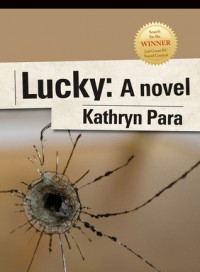Rod Raglin
This blog will touch on the experiences I have as a writer (not to be mistaken for my experience as a writer, i.e. how many books I've written, etc); the pleasure and the pain, the joy and the grief, the satisfaction and the frustration, the magic and the reality - have I left anything out, oh yeah, the rejection, rejection and more rejection, the humiliation and the embarrassment, the jealousy and the resentment - that pretty much covers it, except for why I do it which perhaps I'll realize along the way. Are you totally confused? Good, let's begin.
Lucky – a harsh look at a hopeless situation

Ani is a photojournalist, back from an assignment in Iraq and suffering from post traumatic stress syndrome. She’s got a book deal for photos she took while in Fallujah if she can ever sober up and sort out all the images she shot.
Ani is also haunted by the disappearance of Viva, her guide, interpreter and friend during her time in the Middle East.
Ani’s publisher introduces her to Levi in hopes he can encourage her to face her demons by getting to work on the book. Levi is a journalist who has covered the same beat as Ani and could perhaps provide empathy for her and text for the photos.
Author Kathryn Para skillfully weaves the past – Ani’s last assignment that took her to Fallujah, with the present – her deteriorating mental condition as a result of what happened there.
When Para recounts the past she uses the third person, for the present she uses the first person, a technique that works very well.
As the story unfolds it becomes apparent the key to Ani’s past and the salvation for her future are in the box of images she took in Fallujah, the ones she can’t bear to look at.
Lucky is a harsh story. Nothing good apparently has ever happened to Ani – her mother was bi-polar and was killed along with her father when their vehicle was hit by a fully loaded logging truck on an icy road. Her older brother is also dead. She can’t seem to have fulfilling relationships. Even her cat runs away.
The events she witnesses in Iraq and Syria are horrific. The people she meets duplicitous.
This reader had some difficulty understanding Ani’s motivation to become an imbedded photojournalist with the mujahidin defending Fallujah against the American assault. It seemed like a suicide mission – if she isn’t killed by American bombs and artillery, she’d likely be killed be the mujahidin as a spy or simply because she’s an infidel.
And for what, more photos of innocents suffering in the Middle East?
There also were a few significant instances of what I would consider author intrusion in the story. One where a folk tale is told by an old woman in great detail and at great length for no apparent reason, and another of a trip to Egypt where the same is repeated about Temple of Amun at Karak. Both these instances did not develop character or advance the plot and seemed to serve no purpose other than for the author to expound her knowledge of Syrian mythology and Egyptian antiquity.
There also were times when the author appeared to try too hard with her imagery and diction rejecting an appropriate word or phrase and reaching for something more original. Rather than enhance the narrative these too clever odd word pairings gave me pause and pulled me out of the reading experience.
When I finished this novel I was reminded of a quote by Anne Lamott in her book Bird by Bird: Some Instructions on Writing and Life:
“There’s no point writing hopeless novels. We all know we're going to die; what's important is the kind of men and women we are in the face of this.”
Though well conceived and constructed, and for the most part very well written, Lucky by Kathryn Para is just that, a hopeless novel.

 1
1



